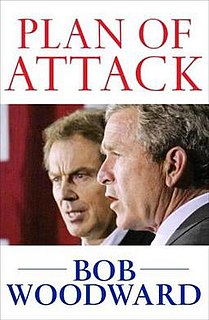John Stauber is an American progressive writer. Stauber has co-authored five books about government propaganda, private interests and the public relations industry. His work includes one book about how industry manipulates science, one about the history and current scope of the public relations industry, and one about mad cow disease, which predicted the surfacing of the disease within the United States.

A weapon of mass destruction (WMD) is a nuclear, radiological, chemical, biological, or any other weapon that can kill and bring significant harm to numerous individuals or cause great damage to artificial structures, natural structures, or the biosphere. The scope and usage of the term has evolved and been disputed, often signifying more politically than technically. Originally coined in reference to aerial bombing with chemical explosives during World War II, it has later come to refer to large-scale weaponry of warfare-related technologies, such as chemical, biological, radiological, or nuclear warfare.

The Iraq disarmament crisis was claimed as one of primary issues that led to the multinational invasion of Iraq on 20 March 2003. Since the 1980s, Iraq was widely assumed to have been producing and extensively running the programs of biological, chemical and nuclear weapons. Iraq made extensive use of chemical weapons during the Iran–Iraq War in the 1980s, including against its own Kurdish population. France and the Soviet Union assisted Iraq in the development of its nuclear program, but its primary facility was destroyed by Israel in 1981 in a surprise air strike.

Hans Martin Blix is a Swedish diplomat and politician for the Liberal People's Party. He was Swedish Minister for Foreign Affairs (1978–1979) and later became the head of the International Atomic Energy Agency. As such, Blix was the first Western representative to inspect the consequences of the Chernobyl disaster in the Soviet Union on site, and led the agency response to them. Blix was also the head of the United Nations Monitoring, Verification and Inspection Commission from March 2000 to June 2003, when he was succeeded by Dimitris Perrikos. In 2002, the commission began searching Iraq for weapons of mass destruction, ultimately finding none. On 17 March 2003, U.S. President George W. Bush delivered an address from the White House announcing that within 48 hours, the United States would invade Iraq unless Saddam Hussein would leave. Bush then ordered all of the weapons inspectors, including Blix's team, to leave Iraq so that America and its allies could invade Iraq on 20 March. In February 2010, Blix became head of the United Arab Emirates' advisory board for its nuclear power program. He is the former president of the World Federation of United Nations Associations.

Iraq actively researched and later employed weapons of mass destruction (WMD) from 1962 to 1991, when it destroyed its chemical weapons stockpile and halted its biological and nuclear weapon programs as required by the United Nations Security Council. The fifth President of Iraq, Saddam Hussein, was internationally condemned for his use of chemical weapons during the 1980s campaign against Iranian and Kurdish civilians during and after the Iran–Iraq War. In the 1980s, Saddam pursued an extensive biological weapons program and a nuclear weapons program, though no nuclear bomb was built. After the Persian Gulf War (1990–1991), the United Nations located and destroyed large quantities of Iraqi chemical weapons and related equipment and materials; Iraq ceased its chemical, biological and nuclear programs.

This article describes the positions of world governments before the actual initiation of the 2003 invasion of Iraq, and not their current positions as they may have changed since then.

Significant opposition to the Iraq War occurred worldwide, both before and during the initial 2003 invasion of Iraq by a United States-led coalition, and throughout the subsequent occupation. People and groups opposing the war include the governments of many nations which did not take part in the invasion, and significant sections of the populace in those that did.

The 2003 invasion of Iraq was the first stage of the Iraq War. The invasion phase began on 19 March 2003 (air) and 20 March 2003 (ground) and lasted just over one month, including 26 days of major combat operations, in which a combined force of troops from the United States, the United Kingdom, Australia and Poland invaded Iraq. The capital city of Baghdad was captured by Coalition forces on April 9, 2003 after the six day long Battle of Baghdad. This early stage of the war formally ended on 1 May 2003 when U.S. President George W. Bush declared the "end of major combat operations" in his Mission Accomplished speech, after which the Coalition Provisional Authority (CPA) was established as the first of several successive transitional governments leading up to the first Iraqi parliamentary election in January 2005. U.S. military forces later remained in Iraq until the withdrawal in 2011.

William Scott Ritter Jr. is a former United Nations weapons inspector in Iraq from 1991 to 1998. He later became a critic of United States foreign policy in the Middle East. Prior to the invasion of Iraq in March 2003, Ritter stated that Iraq possessed no significant weapons of mass destruction (WMD) capabilities, becoming according to The New York Times "the loudest and most credible skeptic of the Bush administration’s contention that Hussein was hiding weapons of mass destruction." He currently writes weekly op-eds for Russian state-controlled media RT.

The Commission on the Intelligence Capabilities of the United States Regarding Weapons of Mass Destruction is a panel created by Executive Order 13328, signed by U.S. President George W. Bush in February 2004. The impetus for the Commission lay with a public controversy occasioned by statements, including those of Chief of the Iraq Survey Group, David Kay, that the Intelligence Community had grossly erred in judging that Iraq had been developing weapons of mass destruction (WMD) before the March 2003 start of Operation Iraqi Freedom. President Bush therefore formed the Commission, but gave it a broad mandate not only to look into any errors behind the Iraq intelligence, but also to look into intelligence on WMD programs in Afghanistan and Libya, as well as to examine the capabilities of the Intelligence Community to address the problem of WMD proliferation and "related threats." However, the commission was not directed to examine the extent to which the Bush administration may have manipulated the intelligence.

Plan of Attack is a 2004 book by the American author and investigative reporter Bob Woodward. It was promoted as "a behind-the-scenes account of how and why President [George W.] Bush decided to go to war against Iraq".
William Rivers Pitt is an author, editor, and political activist.

The Senate Report on Iraqi WMD Intelligence was the report by the United States Senate Select Committee on Intelligence concerning the U.S. intelligence community's assessments of Iraq during the time leading up to the 2003 invasion of Iraq. The report, which was released on July 9, 2004, identified numerous failures in the intelligence-gathering and -analysis process. The report found that these failures led to the creation of inaccurate materials that misled both government policy makers and the American public.

The White House Iraq Group was an arm of the White House whose purpose was to inform the public about the purpose of the 2003 invasion of Iraq. The task force was set up in August 2002 by White House Chief of Staff Andrew Card and chaired by Karl Rove to coordinate all of the executive branch elements in the run-up to the war in Iraq. However, it is widely speculated that the intention of the task force was "escalation of rhetoric about the danger that Iraq posed to the U.S., including the introduction of the term 'mushroom cloud'".

Aluminum tubes purchased by the nation of Iraq were intercepted in Jordan in 2001. In September 2002 they were publicly cited by the White House as evidence that Iraq was actively pursuing an atomic weapon. Prior to the 2003 invasion of Iraq, many questioned the validity of the claim. After the invasion, the Iraq Survey Group determined that the best explanation for the tubes' use was to produce conventional 81-mm rockets; no evidence was found of a program to design or develop an 81-mm aluminum rotor uranium centrifuge.

The rationale for the Iraq War, both the 2003 invasion of Iraq and the subsequent hostilities, was controversial because the George W. Bush administration began actively pressing for military intervention in Iraq in late 2001. The primary rationalization for the Iraq War was articulated by a joint resolution of the United States Congress known as the Iraq Resolution.

A Pretext for War: 9/11, Iraq, and the Abuse of America's Intelligence Agencies is a 2004 book by journalist James Bamford that takes a highly critical view of the events around 9/11 and the subsequent Iraq War.
The 2003 United States–British–Spanish Draft Resolution on Iraq was, according to Ambassador John Negroponte, "a resolution to have the Council decide that Iraq is not complying, is out of compliance, with Resolution 1441". Initially introduced on February 24, 2003 and amended on March 7, 2003, the draft set a March 17 deadline for Iraq to demonstrate "full, unconditional, immediate and active cooperation in accordance with its disarmament obligations." The draft was based on information from the Iraqi defector "Curveball," who claimed Saddam Hussein was in possession of weapons of mass destruction, which Curveball later admitted was untrue. The widely discussed UN resolution was not brought up for formal vote after it became clear that it would not have passed due to opposition from France, Russia, and China. The United States invaded Iraq without UN support on March 20, 2003, initiating the Iraq War.

Weapons of mass destruction and their related impacts have been a mainstay of popular culture since the beginning of the Cold War, as both political commentary and humorous outlet.

The lead-up to the Iraq War began with United Nations Security Council Resolution 687 and subsequent UN weapons inspectors inside Iraq. This period also saw low-level hostilities between Iraq and the United States-led coalition from 1991–2003.












